Top Crowdfunding Sites for Business, Nonprofits & More
By Alex Carter on October 7, 2024
Crowdfunding has become a practical solution for individuals, startups, nonprofits, and businesses seeking financial support for their ideas or projects. Instead of relying solely on traditional loans or large investors, crowdfunding allows people to raise money by collecting small contributions from a broad group of supporters. This method not only provides access to funding but can also help test ideas, promote products, and build early engagement with potential customers.
With a variety of platforms available, each offering different features, pricing, and target audiences, it’s important to understand how crowdfunding works and what to look for when choosing a site.
What is Crowdfunding?
Crowdfunding is a way to raise money by collecting small contributions from many individuals to support a business. Unlike traditional fundraising, which often relies on large sums from a few sources like venture capital firms or accredited investors, crowdfunding involves a broader group of supporters.
How Does It Work?
People who support a crowdfunding campaign, often called “backers,” receive rewards in return for their contributions. These rewards can include:
- Early or discounted access to products;
- The option to preorder and give input during development;
- Extra incentives like freebies, loyalty points, or continuous savings;
- Possibilities to communicate with the authors or other backers;
- Equity in the business (in certain types of campaigns);
- Access to exclusive content.
Crowdfunding platforms charge fees for campaign management, payment processing, and transaction management. The basic process is always the same, even if each platform has a different community and pricing structure: publish your campaign with a clear goal and deadline, then promote it to attract backers.
If you are looking at financing possibilities as part of a broader strategy, knowing how to keep your small business running will help you get the most out of your campaign.
How to Evaluate Crowdfunding Platforms: 5 Key Features to Consider
Crowdfunding works by setting up an online campaign to raise money from friends, family, or a wider audience. After contributions are made, the funds are transferred to the organizer’s bank account.
When selecting a crowdfunding platform, it’s important to compare these five key features:
Ease of Use
An excellent platform should be easy to use and intuitive. Look elsewhere if the platform is difficult to use or complex to build a campaign. The most effective websites invite visitors to participate, learn more, and do so with ease.
Customer Support
You and your donors both need dependable assistance. Seek out platforms that provide phone assistance, email help, or live chat. A trustworthy business will have responsive and open customer service.
Tools for Promotion
Check what sharing and outreach tools the site provides. Built-in options for promoting your campaign via social media or email can greatly impact your reach and fundraising success.
Fee Structure
Understand the platform’s fees. Most charge 5% to 12% of the total funds raised. Watch for hidden costs, higher fees for unmet goals, or “all-or-nothing” models that only release funds if you meet your target.
Brand Reputation
Choose a platform with strong brand recognition and positive reviews. A reputable site builds trust among donors and shows a history of transparency and reliability.
Top 25 Crowdfunding Platforms
Kickstarter
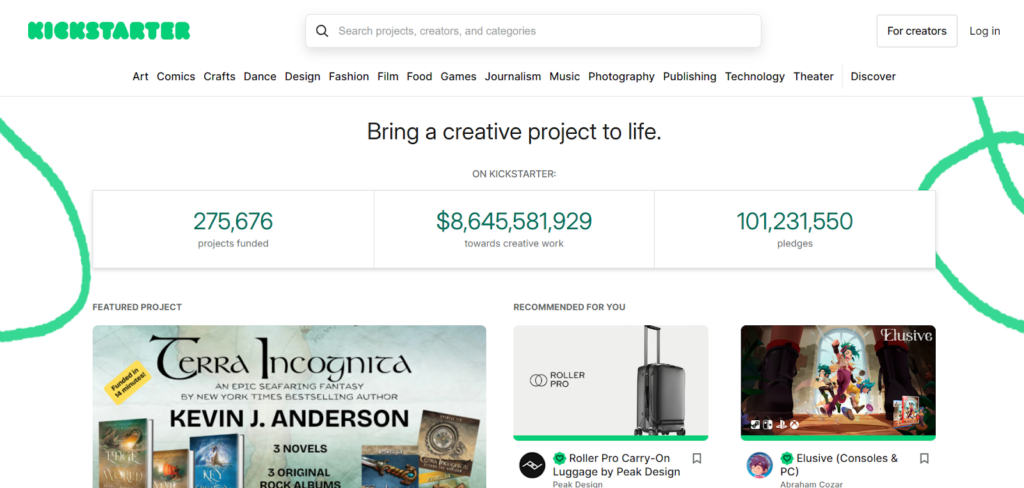
One of the most well-known crowdfunding sites, Kickstarter is renowned for encouraging original and imaginative ideas. The site has assisted in funding more than 250,000 ideas since its launch in 2009, spanning from digital art to tech devices.
Kickstarter uses an all-or-nothing, reward-based business strategy. To promote support, creators provide special benefits like shoutouts, discounts, or early access. Backers are not billed and no money is raised if the campaign falls short of its financing target.
This strategy builds supporter trust and frequently results in campaigns of a better caliber. Kickstarter is particularly well-liked by producers who want to release digital or physical goods that catch the attention of early adopters and the press.
In terms of cost, Kickstarter levies a 5% platform fee if your campaign is successful. In addition, transaction costs range from 3% to 5% per pledge, with a $0.30 charge every transaction. For pledges under $10, a micro-pledge charge of 5% + $0.08 is applied.
Pros:
- Large, engaged user base;
- Motivating all-or-nothing model;
- Great for creative or innovative projects.
Cons:
- No funds if the goal isn’t met;
- 5% fee plus processing costs;
- Not suitable for personal or charitable causes.
Indiegogo
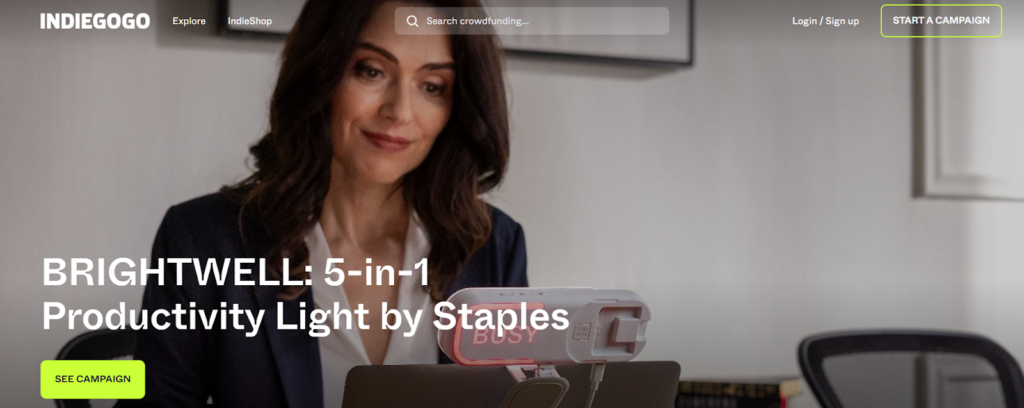
Indiegogo is a strong alternative to Kickstarter, supporting entrepreneurs, artists, and nonprofits. It offers flexible tools and lets creators choose between two funding models: fixed (all-or-nothing) or flexible (keep what you raise).
Flexible funding is useful for ongoing or multi-phase projects, allowing you to begin fulfilling promises even if the campaign doesn’t fully reach its goal. Additionally, the InDemand feature lets you keep raising money after the campaign ends—helpful for covering extra costs or scaling post-launch.
Indiegogo charges a 5% fee on the total amount raised, regardless of whether your goal is met or not. Transaction fees add another 3% plus $0.20 per pledge.
Pros:
- Option to keep funds even if goals aren’t met;
- Suitable for a wide variety of projects;
- Continued fundraising after campaign ends.
Cons:
- Same 5% fee plus additional charges;
- Smaller user base than Kickstarter;
- Flexible funding may leave you underfunded.
Fundable
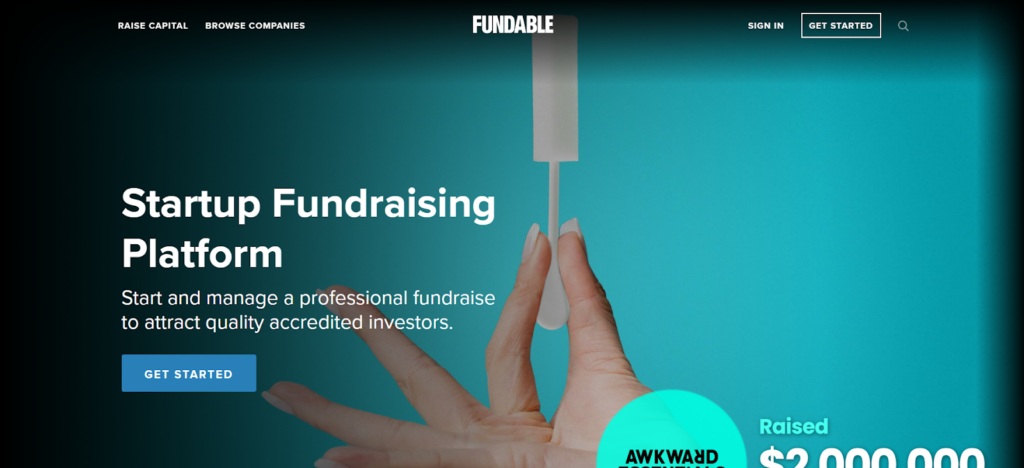
Fundable, a part of the entrepreneurs.com network, is intended for US-based entrepreneurs looking to generate capital through rewards or equity crowdfunding. It allows businesses to execute campaigns on their own or with Fundable’s assistance, such as pitch deck creation and investor outreach.
The platform accepts both reward-based and equity-based schemes. Reward campaigns often draw a greater number of smaller donations, whereas equity crowdfunding frequently involves fewer persons contributing bigger sums. For equity campaigns, startups must provide detailed financial and business documentation, including growth metrics and a professional pitch.
Fundable charges a flat fee of $179 per month to run a campaign. Unlike many platforms, there are no success-based fees—this pricing remains the same whether or not the campaign meets its goals.
Pros:
- Flexibility to choose rewards or equity;
- Access to expert campaign support;
- Tailored for startups and small businesses.
Cons:
- High monthly cost compared to other platforms;
- Equity campaigns require detailed disclosures;
- Only available to U.S.-based businesses.
Crowdfunder
Crowdfunder is a Shopify app that enables e-commerce sellers to run crowdfunding campaigns directly on their own websites. Instead of redirecting customers to third-party platforms, it allows you to turn your existing product pages into campaign pages with features like progress bars, goal tracking, and preorder functionality. This tool is especially useful for brands testing demand for new products or limited-run items. It simplifies the process by letting you collect pre-orders as a way to validate ideas and fund production.
Crowdfunder uses a fixed monthly pricing model—subscriptions cost $24 per month—so users don’t pay commissions or percentage-based fees on funds raised.
Pros:
- Smooth integration with Shopify stores;
- Clear, flat monthly pricing;
- Allows direct crowdfunding through product pages.
Cons:
- No built-in community of backers;
- Only available for Shopify users.
Patreon
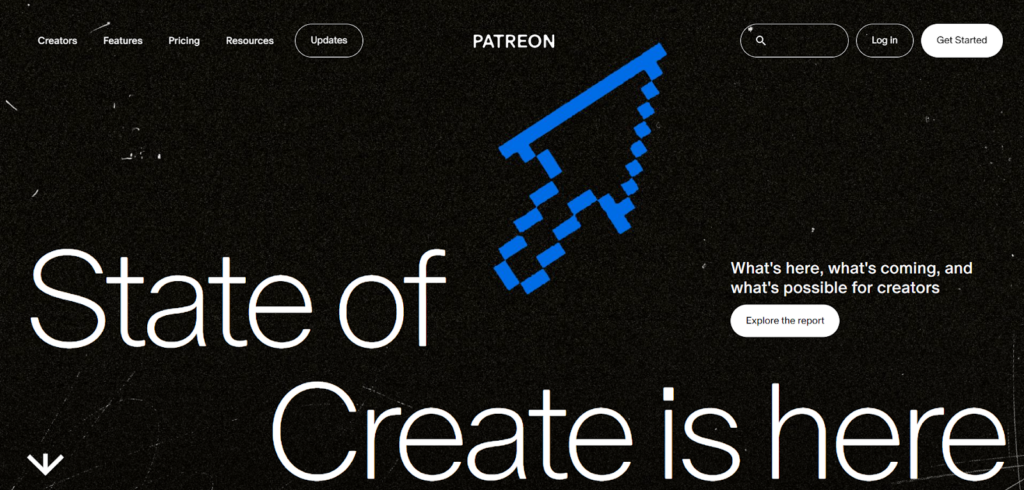
Patreon is a membership-based crowdsourcing platform for digital creators, including podcasters, video producers, singers, and authors. Unlike traditional crowdfunding platforms, which focus on one-time campaigns, Patreon allows creators to collect ongoing subscription revenue via tiered membership choices.
Supporters, sometimes known as “patrons,” pay a monthly or per-content charge for exclusive privileges, including early content releases, behind-the-scenes access, community forums, livestreams, and more. The website also takes credit cards, PayPal, Apple Pay, and Venmo.
Patreon charges a percentage of a creator’s earnings, which ranges from 8% to 12%, depending on the plan selected. Additional processing fees apply and can be as high as 6% plus 10¢ per transaction, depending on the payment method.
Pros:
- Reliable monthly income stream;
- Strong tools for building a creator community;
- Integrations for exclusive content, videos, newsletters, and more.
Cons:
- Not suitable for one-time campaigns;
- Platform fees can be relatively high;
- Requires time to build a loyal patron base.
Crowdcube
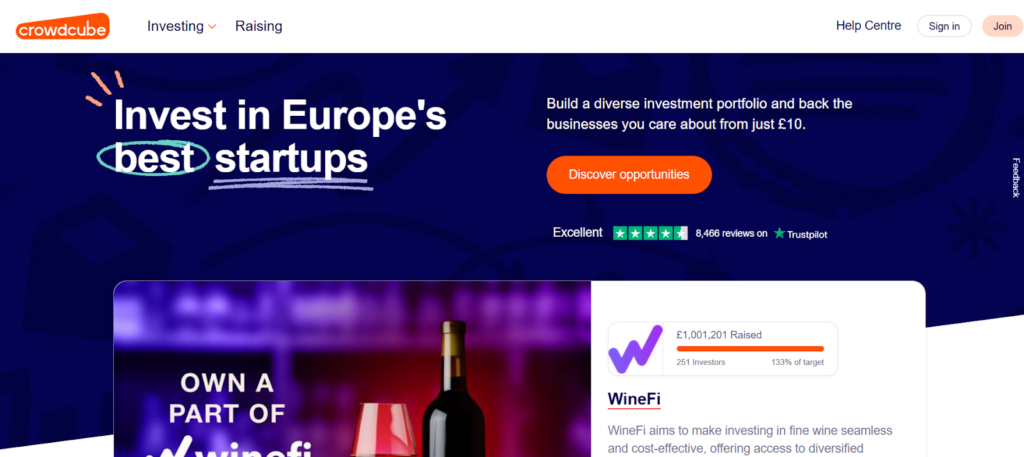
Crowdcube is a UK-based equity crowdfunding platform aimed at European enterprises. Unlike many platforms aimed toward US firms, Crowdcube is intended to help entrepreneurs in the UK and EU secure financing through a variety of stock offerings, including private rounds and follow-up fundraising.
Founders can market their proposal directly to their personal networks or use Crowdcube’s built-in investor community. The technology may also help with duties like dividend distribution and investor communications. Although the number of Crowdcube campaigns is restricted, firms that exceed their financing objectives get access to the exclusive Funded Club, which provides extra benefits through partnerships.
Crowdcube charges a 7% success fee on the total funds raised. In addition, a completion fee of between 0.75% and 1.5% is applied, along with payment processing charges of up to 2.9%.
Pros:
- Specifically designed for UK and European businesses;
- Supports various types of equity crowdfunding;
- Access to exclusive post-funding benefits.
Cons:
- 7% platform fee plus additional charges;
- Not suitable for businesses outside of Europe;
- Limited number of active campaigns.
GoFundMe
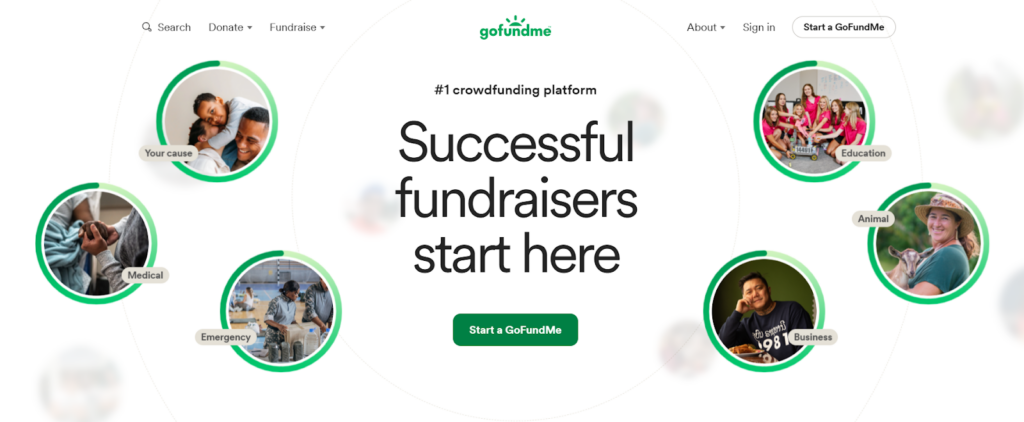
GoFundMe is a popular fundraising tool for personal needs, philanthropic organizations, and community initiatives. Unlike sites that specialize in product or commercial campaigns, GoFundMe is intended to assist individuals pay for everything from medical expenses and tuition expenditures to memorial funds or disaster relief initiatives.
Anyone can launch a campaign, and most fundraising comes from friends, family, or community members. However, successful campaigns may gain visibility and attract wider support through shares and organic reach. While it’s not built for commercial or investment-based fundraising, GoFundMe can be a good option for small business owners in distress or people needing urgent help.
There’s no platform fee to launch a fundraiser, but standard payment processing charges of 2.9% plus $0.30 per donation apply.
Pros:
- Great for personal and charitable causes;
- No platform fee for campaigns.
Cons:
- Not intended for business or commercial fundraising;
- Campaign success often depends on personal connections.
Mightycause
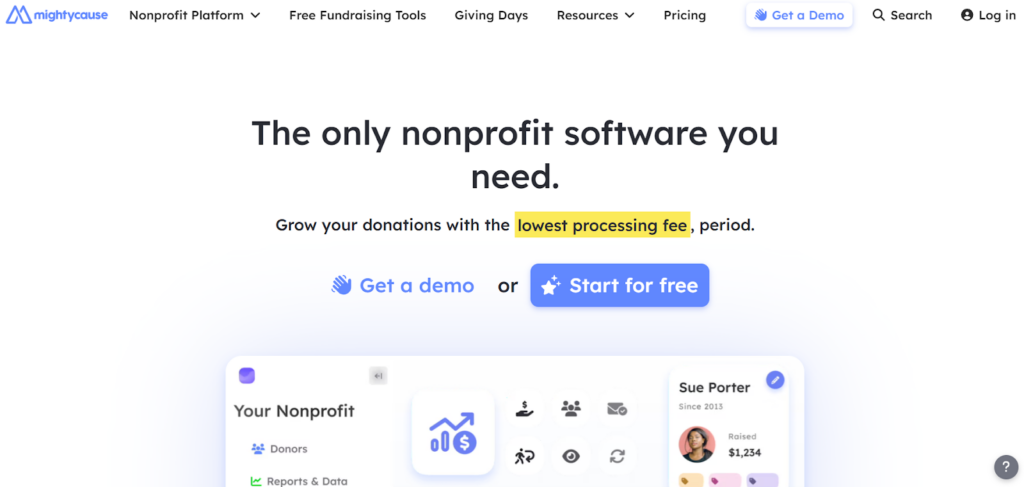
Mightycause has been assisting NGOs in raising cash since 2006, with more than $600 million raised through their platform. Instead of depending on a centralized contribution site, Mightycause provides embeddable fundraising tools that NGOs may integrate directly into their websites. These include configurable fundraising sites, donation buttons, and support for email, SMS, and social media platforms.
The platform also includes built-in donor management capabilities, including a CRM system and thorough data dashboards. Nonprofits may launch an infinite number of peer-to-peer, team, and event-based campaigns without respect for fundraising targets, allowing them to keep all monies generated regardless of the outcome.
Mightycause’s monthly pricing starts at $79 and goes up to $119 for higher-tier subscriptions. Processing costs for payments can reach 1.9% + $0.49 each transaction.
Pros:
- Designed specifically for nonprofit fundraising;
- No minimum goal requirement to access funds.
Cons:
- Monthly subscription cost can be high;
- Not suitable for for-profit ventures.
CrowdStreet
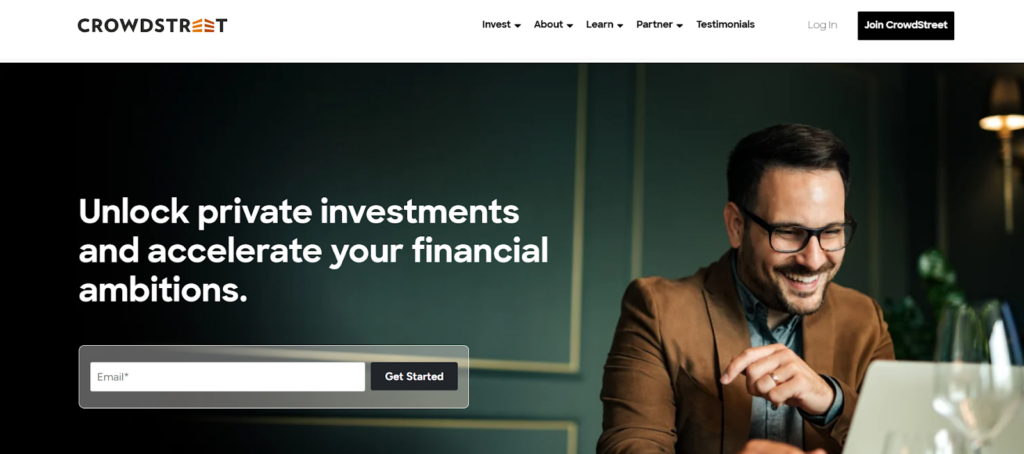
CrowdStreet is a niche crowdfunding platform designed specifically for commercial real estate investing. It allows individual investors to contribute capital to vetted real estate projects, and to date, it has facilitated over $4 billion in total investments.
Real estate sponsors can apply to list their projects on the CrowdStreet marketplace to raise capital for construction, development, or other financial initiatives. Beyond just hosting deals, CrowdStreet offers investor management services and supports campaigns with digital marketing resources to help sponsors reach potential backers.
This platform is primarily geared toward established real estate firms working on commercial developments. It also publishes an annual market outlook that highlights trends and project types attracting the most investor interest.
The fee structure on CrowdStreet varies depending on the specifics of each deal and is typically arranged between the sponsor and the platform.
Pros:
- Focused exclusively on real estate projects;
- Offers marketing and investor management tools.
Cons:
- Limited to experienced commercial real estate firms;
- Rigorous application and vetting process.
StartEngine
StartEngine is a top equity crowdfunding platform that helps startups raise up to $5 million under Regulation Crowdfunding (Reg CF). It connects companies with over 1.8 million investors seeking high-growth opportunities. The platform simplifies legal complexities by offering services like financial reviews, documentation, and compliance support. For those raising under $107,000, it allows simpler reporting, making it accessible to smaller startups. Founders must invest in their campaign upfront and show growth potential. In return, StartEngine supports the fundraising process and boosts exposure.
Fees on StartEngine vary by campaign and typically range from 5.5% to 13% of the funds raised.
Pros:
- Enables equity-based public fundraising;
- Offers legal and financial setup services.
Cons:
- Requires considerable preparation and documentation;
- High commission rates depending on the campaign.
Classy
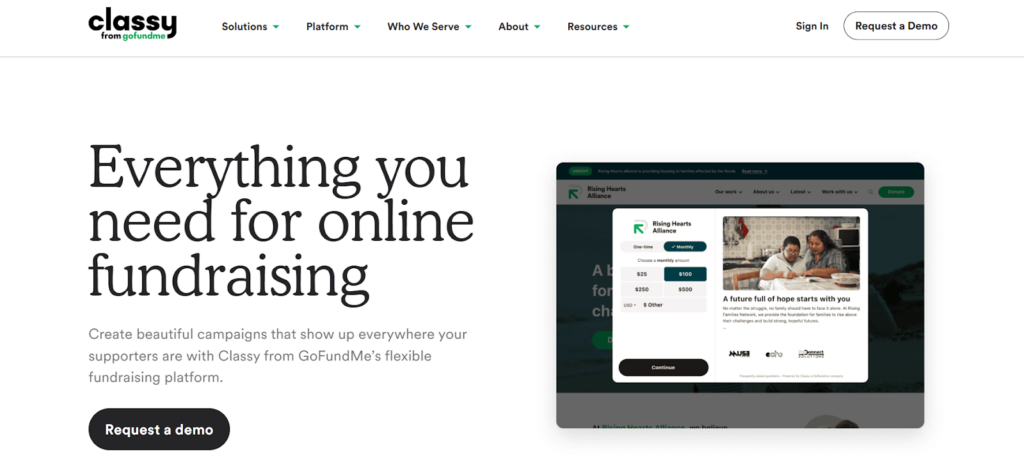
Classy is a fundraising platform designed for charitable organizations that must oversee large-scale fundraising operations. It provides facilities for tickets, team fundraising, registration, campaign pages, contribution forms, and virtual event administration.
Classy’s built-in reporting dashboards, which are intended to enable continuous and extensive fundraising activities, assist organizations in monitoring contributions, engagement, and campaign performance over time. Nonprofits holding peer-to-peer fundraising through various channels or virtual events will find it particularly helpful.
Classy does not list standard pricing publicly; organizations must request a custom quote to access its fundraising suite. However, Classy Pay—its payment processing system—charges fees based on the payment method used. Most credit card transactions are processed at a rate of 2.2% plus $0.30 per transaction.
Pros:
- Designed specifically for nonprofit organizations;
- Supports scalable and multi-channel fundraising.
Cons:.
- Pricing is not transparent;
- Not intended for commercial fundraising or individual users.
Fundly
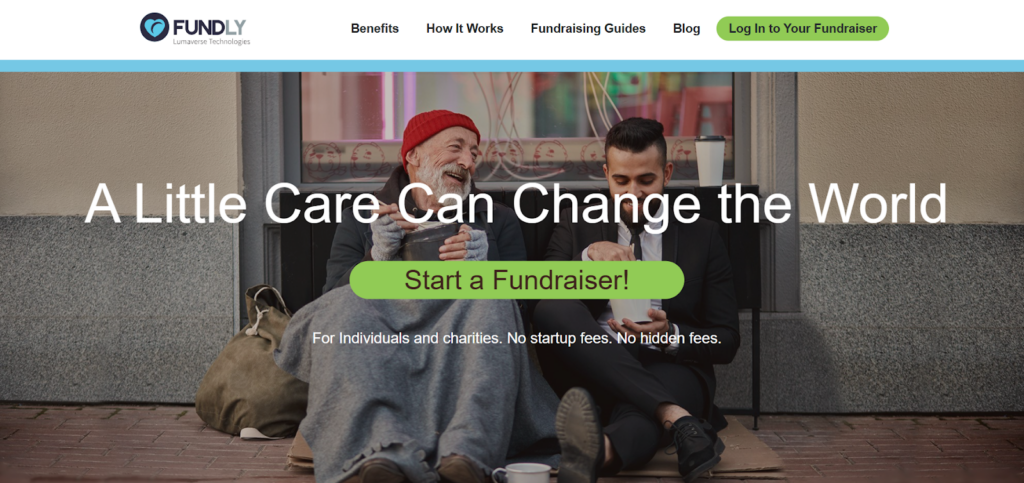
A platform for both individuals and nonprofits, Fundly supports digital fundraising for a variety of causes, including fraternities, military groups, and political campaigns.
Fees: Fundly charges a payment processing fee of 2.9% plus $0.30 per transaction. Additional fees may apply for Stripe and international donations.
FundRazr
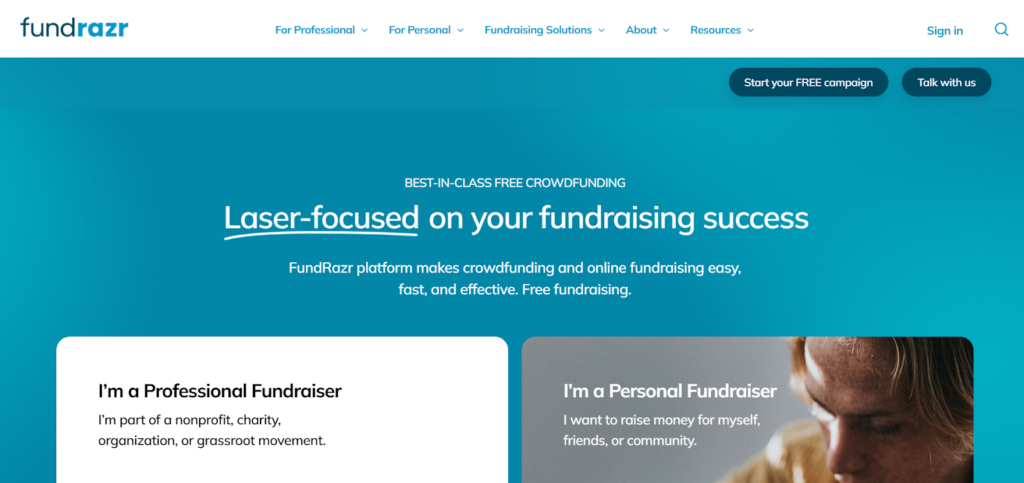
FundRazr allows individuals, nonprofits, and businesses to raise money for personal or community causes. It offers two fundraising models: keep-it-all or all-or-nothing, where funds are only received if the goal is met.
Fees: Individuals can use the platform without a platform fee (supporters are prompted for optional tips). Organizations can choose the “Standard” plan with a 5% platform fee plus processing fees, or the “Pro” plan with customizable fees.
DonorsChoose
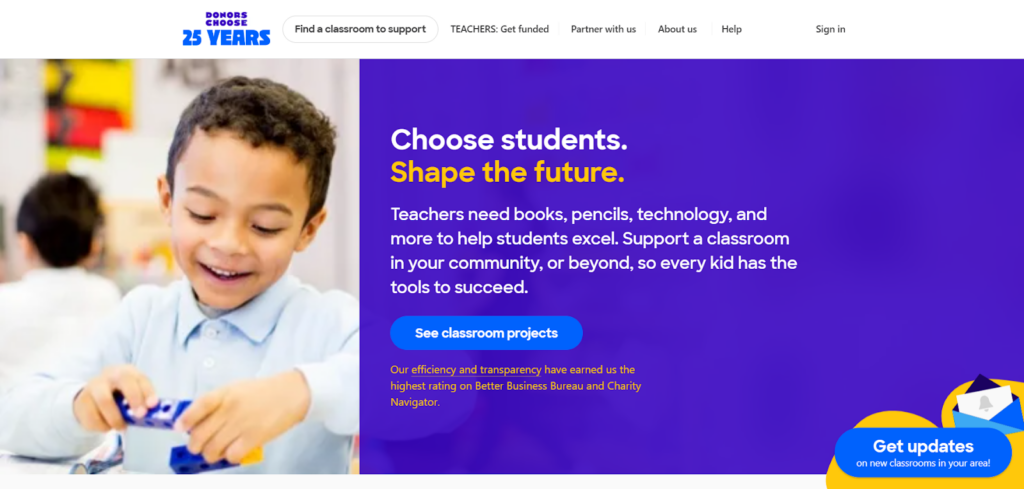
Designed for public school teachers in the U.S., DonorsChoose enables classroom fundraising by allowing educators to post project requests and receive direct donations.
Fees: Payment processing averages 1.5%, with credit card and PayPal donations incurring about a 2.5% fee. DonorsChoose does not charge a platform fee, relying on voluntary contributions to cover operational costs.
GiveCampus
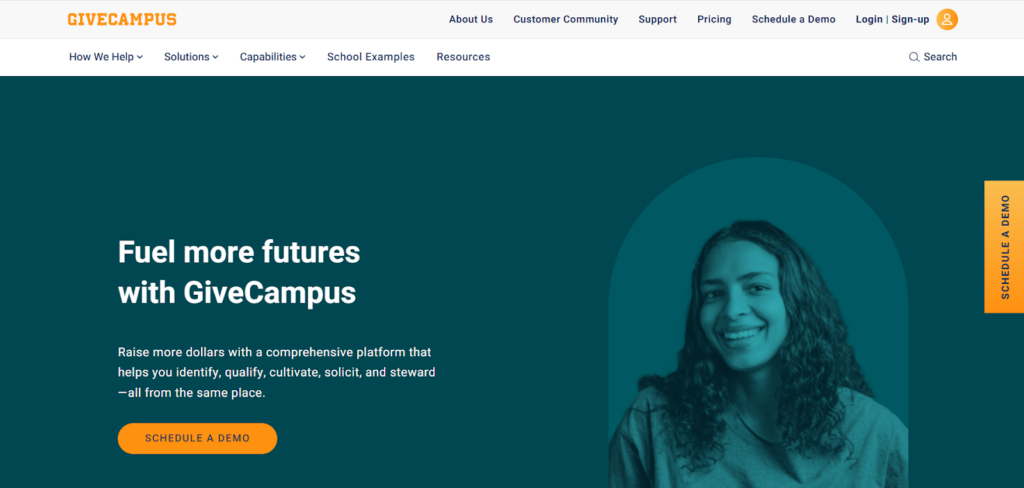
Tailored for educational institutions, GiveCampus helps students, alumni, parents, and faculty fundraise for school-related initiatives. All contributions go directly to the school. A volunteer management feature is also available.
Fees: Schools pay a subscription fee to use the platform. Pricing details are available upon request.
Piggybackr
Piggybackr offers a school-focused fundraising platform where students and parents can raise money individually or as a team for school-related projects. To encourage participation, students earn points and badges for their fundraising efforts.
Fees: 4% platform fee, plus a 2.9% + $0.30 payment processing fee per transaction.
WeFunder
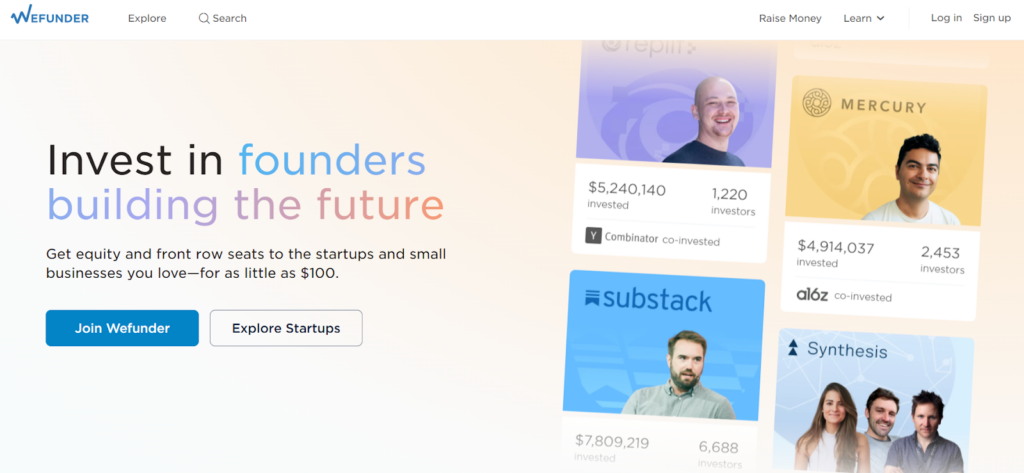
WeFunder helps existing businesses secure funding by allowing everyday investors to buy small equity stakes. The platform emphasizes building investor loyalty through shared ownership.
Fees: Creating a company profile is free. For Regulation CF, WeFunder charges a 7.5% fee on funds raised only if the campaign succeeds. For Regulation A+, there is a flat fee of $375,000.
EquityNet
EquityNet connects entrepreneurs with accredited investors through its equity crowdfunding platform. With a network of over 25,000 investors, it’s designed to help startups attract venture capital and angel funding.
Fees: Pricing varies by subscription model. The “Starter” plan is free, “Premium DIY” is $299/month, and “Full Service” costs $2,990/month.
SeedInvest
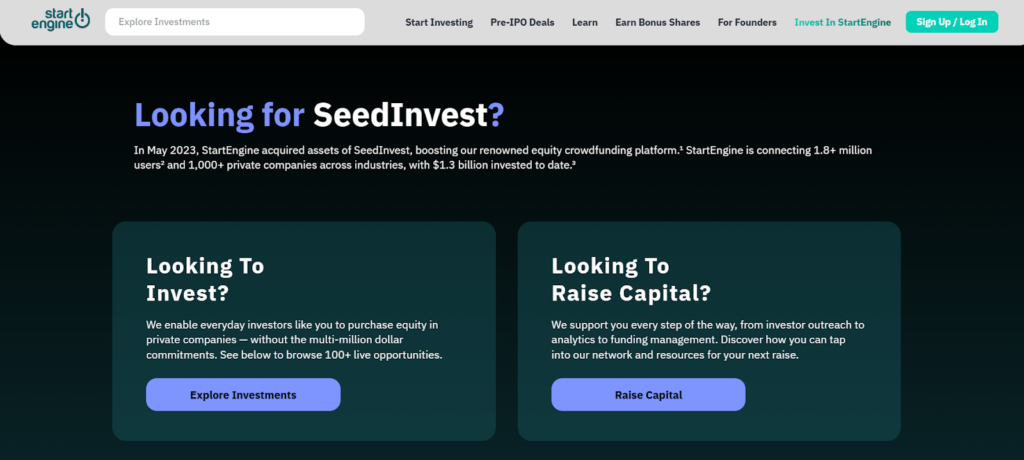
SeedInvest enables startups to raise capital from individual and institutional investors. Campaigns must hit their funding targets before investment deals are finalized.
Fees: 7.5% placement fee, 5% in equity or warrant coverage, and additional fees ranging from $0 to $10,000 for escrow, legal, and marketing costs.
PeerStreet
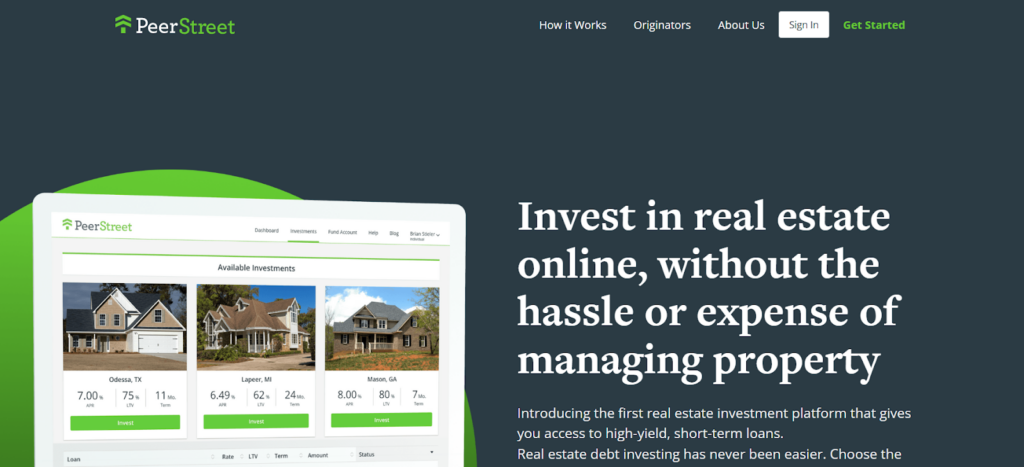
PeerStreet focuses on real estate investing, offering short-term private real estate loans to accredited investors. The platform promotes transparency by allowing users to view past investment records.
Fees: Charges a servicing fee of 0.25% to 1% of the loan amount.
RealCrowd
RealCrowd allows accredited investors to directly invest in commercial real estate projects. The platform eliminates the need for intermediaries, offering access to vetted opportunities.
Fees: Listing fee starts at $15,000, with additional investor processing fees depending on the project.
RealtyMogul

RealtyMogul allows users to invest in both residential and commercial real estate. The platform is open to both accredited and non-accredited investors. Fees vary based on the type of investment—whether it’s a loan or an equity deal. It’s considered a reliable option among real estate crowdfunding platforms.
Fees: Minimum investments vary by offering but can start as low as $5,000.
Honeyfund

Designed for engaged couples and newlyweds, Honeyfund helps raise money for weddings, honeymoons, or big life milestones like a down payment on a home.
Fees: No fees apply to gift card contributions. For cash gifts, funds are transferred to a bank or PayPal account for a fee. Stripe-powered transfers carry a fee of 3.5% + $0.59 per transaction.
Slated
Slated is a film-focused equity crowdfunding platform that assists with financing, casting, and distributing film projects. It also offers optional services like script coverage and financial analysis.
Fees: If distribution is secured through Slated, a 4% fee on gross sales is applied. Additionally, an “In Association With Slated” credit is required at the beginning and end of the film.
Experiment
Experiment supports crowdfunding for scientific research, helping scientists raise money for projects across a variety of fields. Donors can access open data and published results to see how their contributions are used.
Fees: Charges an 8% platform fee and a 2.9% + $0.30 payment processing fee. Uses an all-or-nothing funding model—projects only receive funds if their goals are met.
Why Use Crowdfunding for Your Project? Key Advantages Explained
Crowdfunding offers a range of benefits that make it an appealing option for entrepreneurs, startups, and creative projects. Here are some of the top reasons to consider it:
Access a Wide Network of Potential Backers
Instead of relying on banks or traditional investors, crowdfunding allows you to connect with thousands of people who may be interested in supporting your idea. Many backers are everyday individuals who believe in your project, and some may even become long-term customers.
Test and Validate Your Idea
Crowdfunding provides a real-world test of demand. If people are willing to contribute financially, it signals that your product or service has market potential. It’s also a great way to collect feedback and make improvements before launching on a larger scale.
Boost Visibility and Build Early Momentum
A crowdfunding campaign does more than raise money—it introduces your brand to a broader audience. Supporters often share campaigns with their networks, helping to spread the word organically. Successful campaigns can generate buzz and start building a community around your brand before your product hits the market.
Raise Capital Without Traditional Barriers
Whether you’re launching a new business or developing a product, crowdfunding provides a more accessible way to secure funding. It enables you to pitch directly to customers, fans, or small investors who are excited about what you’re building.
In addition to crowdfunding, small business grants are another source of non-repayable funding that can support your growth.
Conclusion
Crowdfunding is a practical and flexible option for raising funds across a wide range of industries and purposes. Whether you are developing a new product, starting a business, supporting a nonprofit, or funding a personal cause, there is likely a platform that fits your needs. Each site offers different features, pricing models, and types of campaigns, so choosing the right one depends on your goals and resources. By understanding how crowdfunding works and comparing available platforms, you can select an option that helps you reach your target audience and funding goals effectively.
Posted in blog, E-commerce
Alex Carter
Alex Carter is a cybersecurity enthusiast and tech writer with a passion for online privacy, website performance, and digital security. With years of experience in web monitoring and threat prevention, Alex simplifies complex topics to help businesses and developers safeguard their online presence. When not exploring the latest in cybersecurity, Alex enjoys testing new tech tools and sharing insights on best practices for a secure web.
